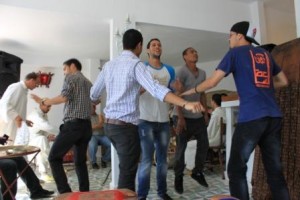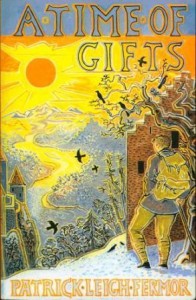![IMG_3683moulay idris#] - lo res](https://www.thewhiterock.co.uk/wp-content/uploads/2011/06/IMG_3683moulay-idris-lo-res.jpg) .
.
The last place I was expecting to go for a party in Morocco was Moulay Idriss. It’s the holiest city in the country, named after the man who founded it and brought Islam to Morocco. Until quite recently, non-Muslims were not supposed to sleep within its whitewashed walls, although they could visit by day.
So it’s a bold move by those behind the popular Cafe Clock in Fez to open a restaurant, the Scorpion House, to try to attract more visitors both here and to the nearby Roman ruins of Volubilis. Mike, the owner, invites my children and me to attend the opening party for staff and friends.
The restaurant has a truly spectacular position on the terraces above the green-roofed mausoleum of the saint. The music and dancing are intense. At one point a young woman gets overcome by the emotion of the moment and faints, apparently overcome by the djinns, spirits. Once he’s checked that she’s all right, Mike seems pleased: “shows it’s a real party.”

This stay in Morocco is a chance to check out what the impact has been of the Arab Spring. Aside from the bombing of a cafe in Marrakesh, there’s been little in the Western news about its effect on one of the Arab countries that is most visited. The King and his government pride themselves on an ecumenical approach – there are Jews and Sufis in important positions – but power is still not equally shared. No one would call the country truly democratic. And many Turkish families still send their daughters here to be educated, as while wearing a veil in Turkish universities is banned, as befits a secular state, it is perfectly permissible here.
The King is well-respected and has announced a wide-ranging review of the constitution, but Morocco has a potent mix of foreign investment and visitors, and a well-educated younger generation with a desire for equality. Expect more djinns to be released.
See Getting Lost in Fez text or as printed



![IMG_3683moulay idris#] - lo res](https://www.thewhiterock.co.uk/wp-content/uploads/2011/06/IMG_3683moulay-idris-lo-res.jpg)
